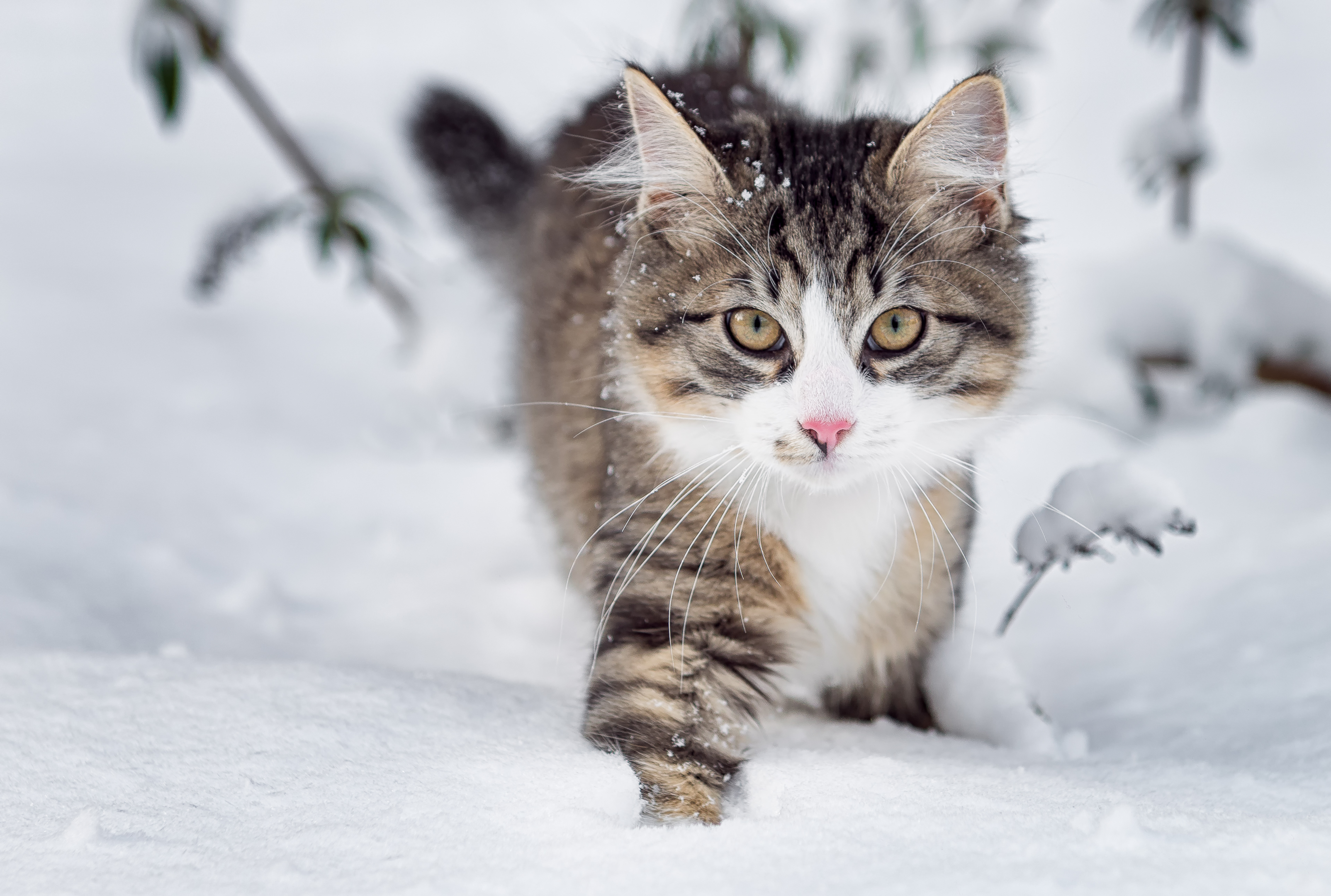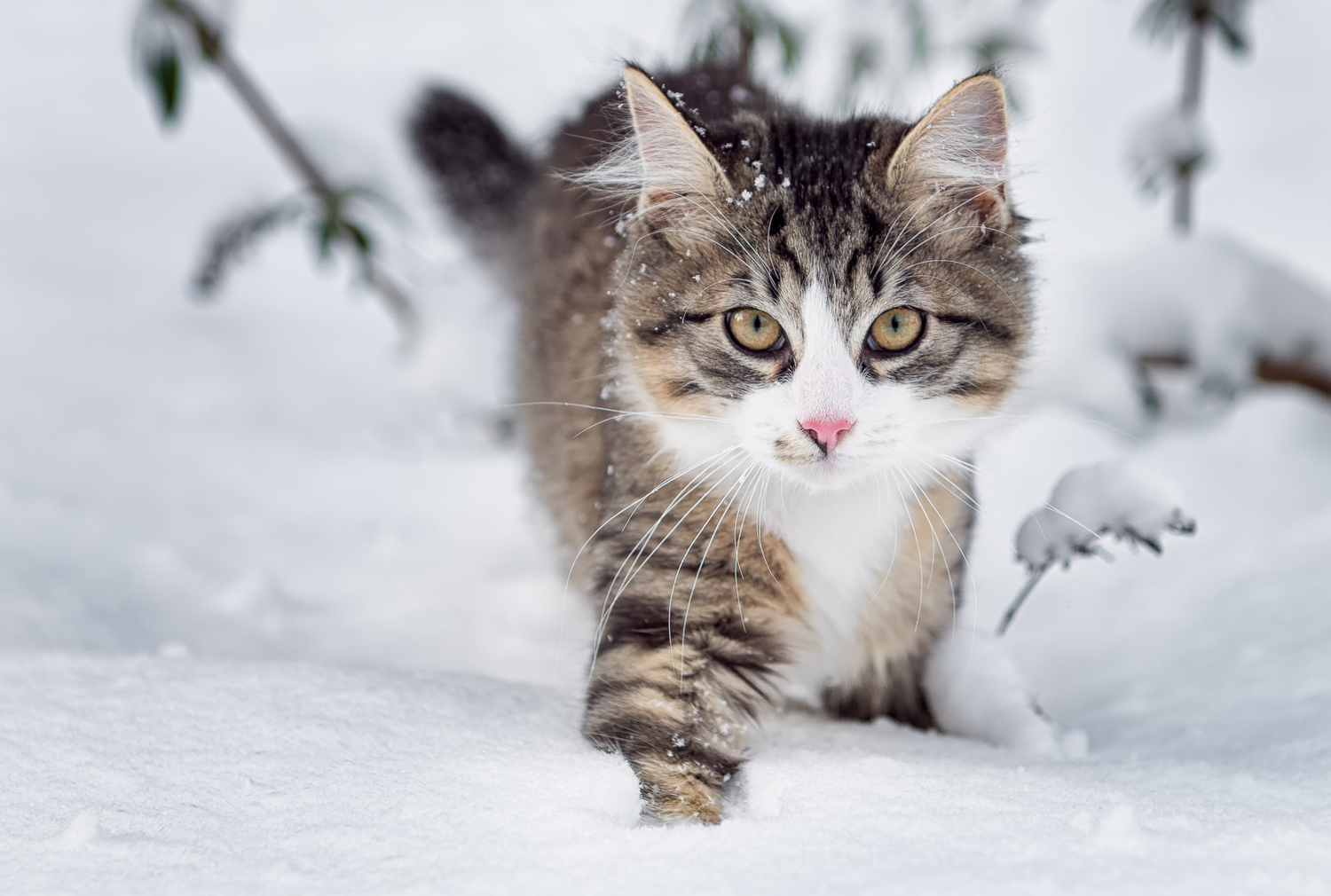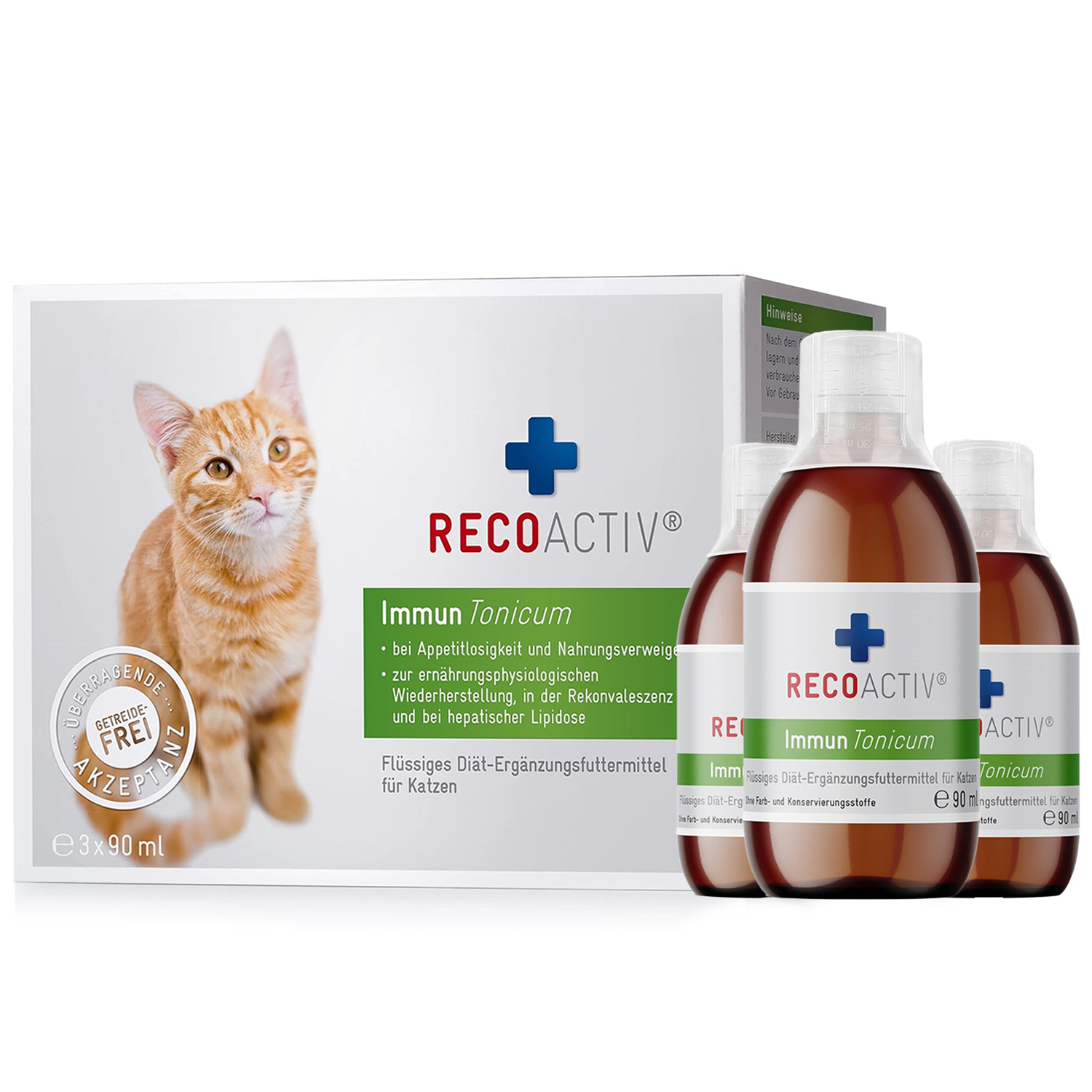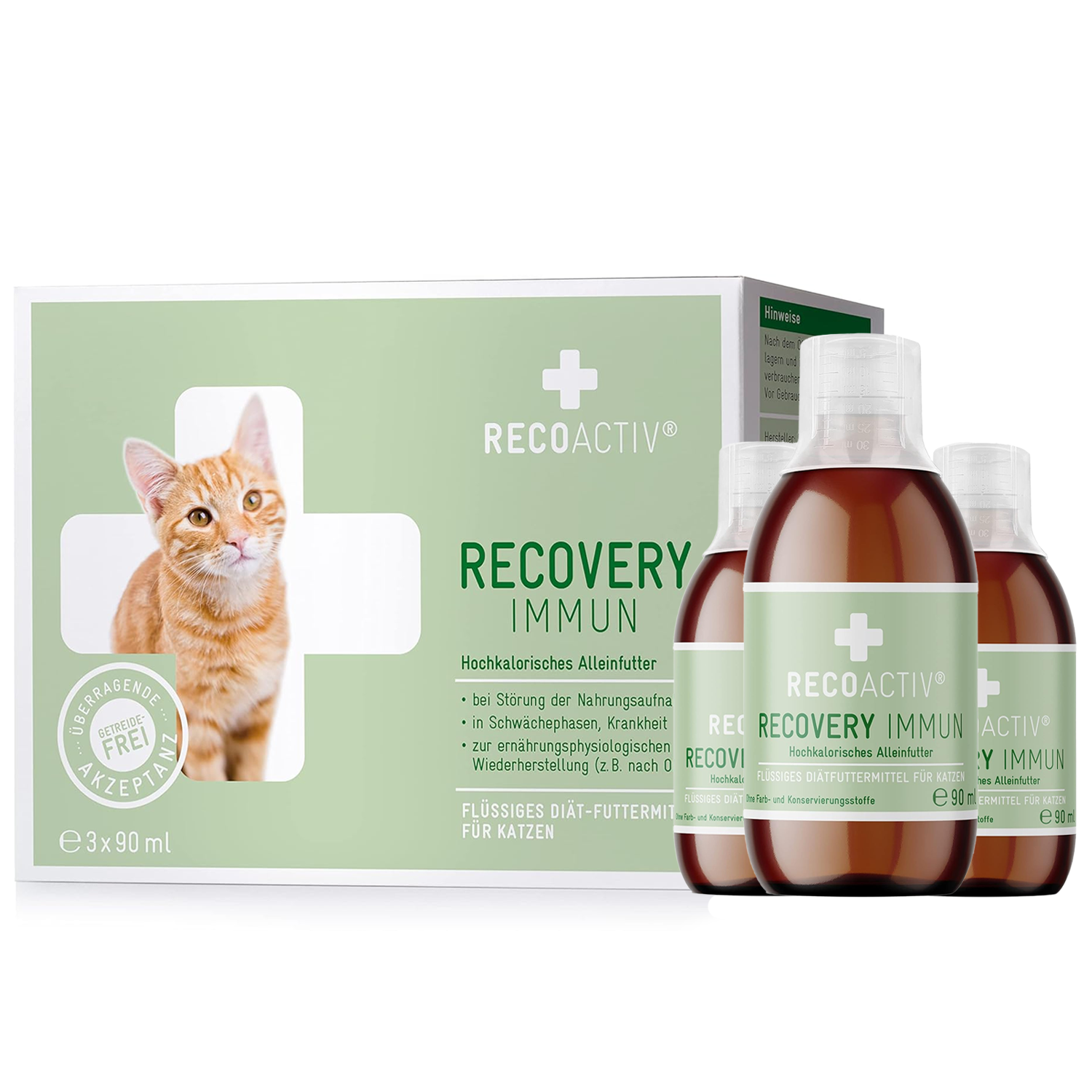A strong immune system is important so that the cat's body can protect itself against pathogens. The basis for this is formed by the first milk in the first hours after the birth of a small kitten. It contains a particularly large number of antibodies, which enable the kitten's immune system to develop and become fully functional over time.
In our article we explain how to successfully strengthen a cat's immune system and we give important tips on proper nutrition for cats.
How does a cat's immune system work?
A cat's immune system is its natural defenses . These are essential so that the animal is protected from pathogens and external influences. While cats receive their first antibodies through their mother's milk , they develop many of their own over the course of their lives. The cat's skin is the first barrier for pathogens, but mucous membranes, hair and stomach acid also provide defense.
The phagocytes are only used when pathogens can overcome them. These detect foreign bodies, surround them and finally break them down. Once a cat's immune system has successfully acted against a specific pathogen, it can "remember" this strategy. It forms specific antibodies that act immediately against the pathogens next time and, in the best case, fight them.

What weakens cats' immune systems?
In order for a cat's immune system to function properly, certain things that could weaken it should be avoided.
This can cause lasting damage to the immune system:
- Unhealthy food: The organs are often overloaded, and they are often metabolized into waste materials and then excreted.
- Obesity: Cats should ideally be of normal weight. Anything else can have a negative impact on metabolic processes, including the immune system.
- Deficiency symptoms: If the cat does not receive all the nutrients it needs for a healthy life, this can result in important control circuits being disrupted or the production of cells being inhibited. It may also be that the deficiency causes the natural barriers, which include the skin and intestinal wall, to become more permeable.
If the cat is weak, a high-calorie complete food often helps.
- Lack of exercise: If cats are noticeably lethargic, their tissues may no longer be able to receive proper blood flow. This leads to a slowdown in the transport of defense and messenger substances.
- Stress: Cats are sensitive animals - some of them are also anxious. Factors that contribute to stress in a cat's life are sometimes barely noticeable to us humans. It is all the more important to get to the bottom of the matter if your cat appears particularly stressed or nervous. Has a new piece of furniture been placed or has another four-legged friend moved in?
- The problem with stress hormones is that they often negatively affect the body's defenses. To calm the cat, loving attention and quiet feeding and sleeping places are particularly important.
- Parasites in the intestine: Occasionally cats are attacked by parasites such as worms. This is not always harmless, especially for young cats. The parasites can multiply quickly in a cat's body and thus affect the immune system.
- Chronic diseases of the organs: If organs such as the kidneys, heart or liver of a cat are diseased, this circumstance can also have a negative effect on the body's defenses. The mechanisms for transporting and producing important substances are then often only possible to a limited extent.
- Infections: Cat disease, the feline leukemia virus or the feline immunodeficiency virus can also be dangerous for the immune system.
- Medication: Medications such as cortisone and chemotherapy drugs inhibit cell division and prevent the production of immune cells.
Strengthen the immune system
The first priority is a healthy diet to strengthen the immune system. This includes ensuring that the cat receives all the important nutrients it needs for a healthy cat life.
If a lack of certain nutrients occurs due to incorrect feeding, the cat's immune system can be negatively affected. That's why you should always give your cat suitable complete food and, if necessary, useful nutritional supplements provide. In this way, the cat's body can produce the important antibodies that protect it from pathogens.
It is also important that the cat gets enough exercise . To encourage exercise, you can either play with her or at least provide her with enough toys to keep her busy. Cats should also be able to get some fresh air regularly. It is recommended that indoor cats have a secured balcony where they can get some fresh air every now and then.
Cats typically sleep up to 17 hours a day . The fact that they can do this undisturbed is also very important for strengthening their immune system. Cats therefore need a comfortable place to sleep and plenty of rest.
Finally, you should also pay attention to adequate hygiene in areas where the cat eats or does its business. Where there is a lack of cleanliness, bacteria can multiply more quickly.
Antibodies to strengthen
Antibodies are protein bodies produced by a cat's immune system. They always successfully protect the animal from viruses, harmful bacteria, fungi or parasites . While small cats absorb their first antibodies with their mother's milk, as already mentioned, more have to be produced over the course of their lives. This is possible by feeding high quality food .
Natural immune boosters for cats
To strengthen the cat's immune system, you can use various medicinal herbs and other natural ingredients . These include rose hips, coneflowers and cat's claw. Ideally, these are contained in a high-quality complete or supplementary food for cats.
Healthy and high quality food
In order for a cat to always produce enough antibodies, it must always receive high-quality nutrients in its diet. Additives such as sugar and grain should not be present in cat food or only in small quantities. Furthermore, the general terms “animal by-products” can indicate that the food is of inferior quality.
If a healthy food has already been found that the cat likes, you can also pamper it with a suitable nutritional supplement . Just make sure that it doesn't suffer from an excess of certain nutrients.
Healthy fats and oils
Essential fatty acids, which are involved in important functions in the cat's body, cannot be produced by cats themselves . Therefore, they must be added to the diet in sufficient quantities and of appropriate quality. Important fats and oils include omega-3 and omega-6 fatty acids . These are involved in building cell membranes. They also have anti-inflammatory properties and have a supporting effect in keeping a cat's liver, kidneys, skin and musculoskeletal system healthy.
Omega-6 fatty acids are found in relatively high amounts in meat and fish , while omega-3 fatty acids can be added to food through oils and fats . Salmon or linseed oil are best suited for this.
Superfood spirulina algae
Among the foods that serve to strengthen a cat's immune system, spirulina algae is considered a real superfood. And rightly so, as in addition to valuable plant proteins, vitamins and minerals, it can also offer support in the event of inflammation and illnesses caused by viruses or bacteria.
liquid
It's no secret that cats are generally bad drinkers . Therefore, you should make sure that both indoor and outdoor cats drink enough fluids throughout the day. If the drinking bowl is outside, it must be checked regularly in winter as a layer of ice can quickly form on it.
Some cats outright refuse to drink water from a regular drinking bowl. Then setting up a special drinking fountain for cats could help. The flowing water encourages the velvet paws to drink.
If that doesn't help, you can choose a wet food that the cat particularly likes. Wet food contains significantly more liquid than dry food for cats and can therefore easily compensate for a lack of liquid.
FAQ
In order for cats to stay in good health for as long as possible, they need strong immune systems. But do cats naturally have a strong immune system? And which vitamins are important to maintain it? We answer these and other questions in this section.
Which vitamins are important for cats?
Vitamins that cats absolutely need are vitamin C (for metabolism and immune system), B vitamins (metabolism and function of the skin), vitamin D (building bones and teeth) and vitamin A (for eyes and muscle building)
What can I do to strengthen the immune system?
A cat needs to be fed high-quality food, get enough exercise and breathe fresh air. Enough rest and sleep are also important to strengthen the body's defenses.
Do cats have a strong immune system?
So that cats can build up a well-functioning immune system, they receive important antibodies in their mother's milk shortly after birth.
Which complete food for cats?
A good complete food for cats must have such a composition that the needs of all nutrients are covered. This can be both wet and dry food. It is important that it is labeled as a complete feed.
Conclusion
Cats - like us humans - need their body's own defense system to keep dangerous pathogens away. They receive their first antibodies from their mother's milk as soon as they are born, but this should increase over the course of their lives.
In order to strengthen a cat's immune system, cat owners are encouraged to eat healthy cat food with all the important nutrients. In this way, you protect your sensitive four-legged friends from infections and provide support at any time of the year.
Recoactive products can make a major contribution to maintaining and strengthening the immune system. As a rule, cats are very happy to accept them.



